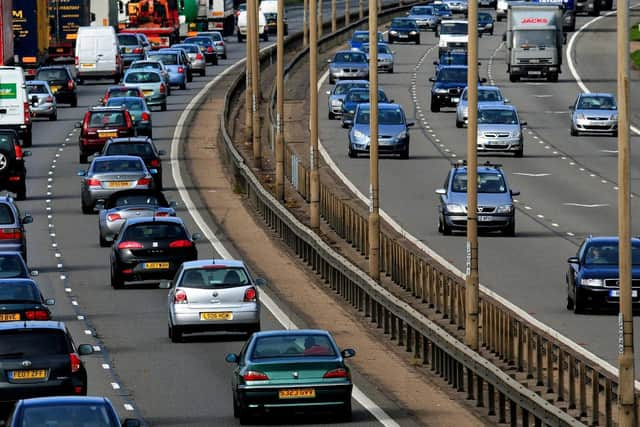E10 fuel could help save the £1bn bioethanol industry, says Stockton South MP Matt Vickers
Stockton South MP Matt Vickers, whose constituency includes areas of North Yorkshire, is calling for the Government to make so-called E10 fuel available at forecourts nationwide.
He says that the introduction of a fuel made partly from agricultural products such as sugar cane or corn would support job creation through emerging green industries, particularly on the Humber.


Advertisement
Hide AdAdvertisement
Hide AdMr Vickers said despite the rise in electric and hybrid cars, vehicles using either petrol or diesel engines still accounted for 83 per cent of new registrations.
Unlike regular unleaded petrol, ethanol fuel is said to be partially atmospherically carbon-neutral. This is because as the plants that will become biofuel grow, they reportedly absorb more carbon dioxide than what will be released into the air during fuel production and combustion
And the co-chair of the All Party Parliamentary Group (APPG) for British Bioethanol, said it was a 'no-brainer' to more widely introduce E10 as part of efforts to "make our roads, cities and country cleaner and greener in the short to medium term".
Current petrol grades in the UK contain up to five per cent bioethanol, known as E5. The proposed E10 fuel increases the share of the renewable energy produced using crops, to 10 per cent.
Advertisement
Hide AdAdvertisement
Hide AdBut campaign groups say there could be as many as 600,000 vehicles on our roads that aren’t compatible with the fuel. It is reportedly expected to hit forecourts at the end of 2021 although a firm date has yet to be secured.
Mr Vickers, who became MP for Stockton South in December 2019 after winning the seat from Labour with a majority of more than 5,000, says that E10 "will help make the UK’s ambitions for carbon neutrality much more achievable - especially before electric vehicles can fully deliver on their potential".
He said: "Drivers want to make cleaner and greener choices, and they should have the freedom to make them next year. The Government also wants to ensure the UK economic recovery in the wake of COVID19 is rapid and balanced, and E10 would help in that effort on growth and levelling up."
The Tory MP added: "Without the swift introduction of E10 - by 2021 at the latest - the British Bioethanol Industry will continue to decline and an industry worth £1 Billion could disappear forever resulting in the loss of thousands of jobs in and around the North of England.
Advertisement
Hide AdAdvertisement
Hide Ad"This isn’t just speculation. In 2018, we witnessed the loss of the Vivergo facility on the Humber, and we cannot see this repeated. The COVID-19 crisis has put additional strain on the remaining operators like Ensus, with lockdown suppressing the demand for fuel.
"The introduction of E10 in 2021 would demonstrate the Government means business when it comes to green businesses especially green businesses based in the North."
E10 is a 'no brainer'
By Matt Vickers
Having recently marked my first anniversary as a Member of Parliament, I’m happy to confirm that this job is not all about disagreement, far from it.
There is in fact a broad political consensus that exists across the House of Commons to urgently address the threat of climate change, poor air quality while supporting job creation through emerging green industries. As the Prime Minister has been clear to point out, levelling up on jobs and economic opportunities is the cornerstone of his Premiership.
Advertisement
Hide AdAdvertisement
Hide AdAs the Co-Chair of the All Party Parliamentary Group (APPG) for British Bioethanol, I am proud to champion one policy which would deliver on all of these priorities, namely the introduction of E10 - a mix of 90% unleaded petrol with a 10% blend of bioethanol. This would sit alongside the E5 fuel already available at forecourts across the country.
Despite the promise of a new generation of electric and hybrid vehicles, there is still a long way to go until these new technologies deliver at a scale. There are in fact an increasing number of petrol cars on UK roads. According to the latest figures from the SMMT, only 5.8% of car registrations in 2020 were purely battery propelled electric vehicles, up from 1.5% in 2019. But vehicles using either petrol or diesel engines still accounted for 83% of new registrations.
How then can we make our roads, cities and country cleaner and greener in the short to medium term? The answer seems obvious. To introduce E10. It’s a no-brainer.
E10 would deliver Greenhouse Gas emissions-savings equivalent to taking up to 700,000 cars off British roads. The British Bioethanol Industry would be a cost-competitive means of carbon mitigation when considered in the context of transport decarbonisation, both in terms of cost per tonne of CO2 abated and also when costed against alternatives. This shouldn’t be a question of E10 or electric, but E10 and electric.
Advertisement
Hide AdAdvertisement
Hide AdE10 wouldn’t just help the UK environment but deliver benefits for places far beyond british shores. The UK imported approximately 735,000 tonnes of soybean and 1,870,000 tonnes of soybean meal, predominantly for use as an animal feed in the agricultural sector in 2017/18.
A successful UK Bioethanol Industry - boosted by E10 - could assist the UK in becoming more self- sufficient in animal feed while also de-risk the potential for UK feed supply chains having an indirect impact on deforestation in other parts of the world which itself is a key contributor to climate change and degradation of important habitats.
There is also a clear economic prize at stake. Without the swift introduction of E10 - by 2021 at the latest - the British Bioethanol Industry will continue to decline and an industry worth £1 Billion could disappear forever resulting in the loss of thousands of jobs in and around the North of England.
This isn’t just speculation. In 2018, we witnessed the loss of the Vivergo facility on the Humber, and we cannot see this repeated. The COVID-19 crisis has put additional strain on the remaining local operators like Ensus, with lockdown suppressing the demand for fuel. The introduction of E10 would demonstrate the Government means business when it comes to green businesses especially green businesses based in the North.
Advertisement
Hide AdAdvertisement
Hide AdThe economic case does not stop at what we would lose, but what we could lose. A profitable Bioethanol Industry located in the North of England would be excellently placed to extend the existing biofuel business to other raw materials for advanced ethanol, likely to be processed in the same plants and alongside the current sustainable bioethanol.
Many of the processes involved in an existing plant including fermentation, distillation, separation, electricity/steam production, downstream storage and loading are identical to that required by an advanced biofuel plant. Co-production of first generation and advanced waste-based ethanol offers the potential to reduce maintenance, supply chain, commercial, IT and financial overheads.
Britain and specifically the North of England could be the future home of important research into advanced second-generation fuels which other sectors like aviation will require as they continue to innovate following COVID19 and for decades to come.
The Department for Transport promised to publish plans by the end of 2020. But as the Christmas lights were being turned on across the country, the Government left the public and the industry in the dark.
Advertisement
Hide AdAdvertisement
Hide AdAnd while the Minister Rachel MacLean provided encouraging words on E10, what we need is action and specifically a firm announcement in January or February if we are to get a well communicated and coordinated roll out of E10 by the end of the year.
So, let's get on with it. Let’s see E10 introduced and ensure that the North East of England is home to a world beating billion-pound Bioethanol Industry and the UK lives up to its environmental ambitions as we build back after COVID. It really is a no brainer.
Comment Guidelines
National World encourages reader discussion on our stories. User feedback, insights and back-and-forth exchanges add a rich layer of context to reporting. Please review our Community Guidelines before commenting.
